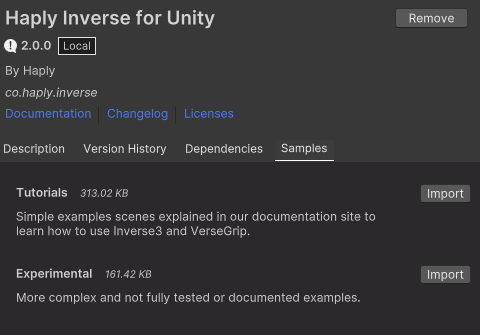Tutorials and Samples
The Haply Inverse Unity Package is complemented by a suite of tutorials and sample projects designed to illustrate the package's capabilities and facilitate a hands-on learning experience. These resources are aimed at both beginners and advanced users, offering a step-by-step approach to mastering the fundamentals of haptic interaction and exploring more sophisticated use cases.
Accessing Tutorials and Samples
The tutorial sample projects are readily available through the Unity Package Manager, ensuring easy integration and experimentation within your projects.

Tutorials Overview
Explore our comprehensive tutorials designed to enhance your proficiency with the Haply Inverse Unity Package. From foundational concepts to advanced haptic feedback mechanisms, these guides are meticulously crafted to provide you with a step-by-step understanding, enriched with code examples and practical insights.
📄️ Basic force and position
This guide provides a simple demonstration of applying forces and visualizing the movement of an Inverse3 cursor.
📄️ Basic force feedback
This tutorial guides you through creating a basic haptic simulation that incorporates both stiffness and damping, simulating the physical properties of contact with a static object, such as a sphere.
📄️ Device workspace transform
This tutorial expands on the Basic Force-Feedback tutorial by demonstrating how to adjust the position, rotation, and scaling of the Inverse3 device using its space transformation properties and methods.
📄️ Force feedback in a dynamic scene
Building on the Basic Force-Feedback tutorial, this guide introduces how to simulate dynamic interactions within Unity, allowing users to feel force feedback from a moving object.
📄️ Simple Position Control
This tutorial demonstrates how to control the cursor position of an Inverse3 device with a dynamic game object within a Unity scene, building upon concepts introduced in the Getting started Guide.
📄️ VerseGrip Position Control
This tutorial demonstrates how to use the VerseGrip's rotation to directly control the position of an Inverse3 device's cursor, bypassing the Unity main thread for high-frequency updates.
Each tutorial is designed to progressively enhance your skills, enabling you to create tactilely engaging interactive experiences leveraging Haply's advanced haptic technology.
Experimental Samples
In addition to the structured tutorials, the package includes experimental samples that test advanced use cases. These samples are less documented and should be considered as exploratory projects that push the boundaries of what's possible with the Haply hardware. They provide a glimpse into potential applications and encourage experimentation with the package's more advanced features.
Conclusion
Whether you're new to haptic technology or looking to expand your knowledge, the tutorials and samples provided with the Haply Inverse Unity Package offer valuable insights and practical experience. By working through these resources, you'll gain a deeper understanding of how to incorporate haptic feedback into your Unity projects, creating more immersive and interactive experiences.
Remember, the experimental samples are a starting point for innovation. They invite you to explore the capabilities of the Haply hardware and Unity's powerful development environment, pushing the limits of haptic interaction design.